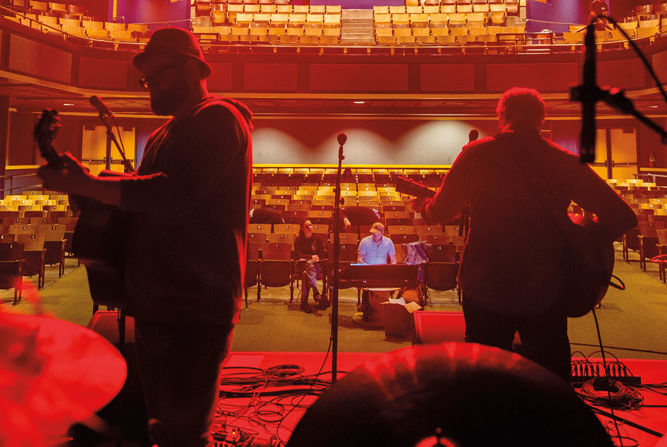20 Years In, Modest Mouse Floats Different, but Floats Nevertheless

Image: Courtesy David Emmite
A week ago I spent a night in a simpler time. No, I don’t mean before the presidential election; I’m referring instead to the year 2004, when one of the aughts’ most popular mainstream-alternative rock records was released by a band based right here in Portland, Oregon. The Modest Mouse record Good News for People Who Love Bad News turns 20 this year, and to celebrate—and cash in, natch—the band has mounted a nationwide tour playing the album front to back, as is the trend with American rock and rap groups of a certain age.
The band recently played three sold-out nights in Portland, at Rev Hall, for which tickets cost a cool $150. You could accurately call these “hometown shows”—frontman and sole original member Isaac Brock moved to Portland in 2004, famously living and rocking out for years in a Craftsman house just off Colonel Summers Park. One of my earliest Portland memories is of a summer park hang eavesdropping on the band’s rehearsal, my friends and I wondering if that was really legendary Smiths guitarist Johnny Marr’s playing we were hearing (he briefly joined the band in the late aughts).
Brock has since moved up to Sylvan, but runs a multistory recording studio and gear-stuffed practice space near Providence Park called Ice Cream Party. In the two decades that followed the release of Good News, the song “Float On” has reached cultural escape velocity, joining the firmament of American public life via its appearance on stadium jock jam playlists and in OnStar and American Express ads. In a way the song’s life mirrors Portland’s own growth trajectory: 20 years ago a cool secret that was ready to go mainstream, and now something like a nostalgia act.
I should note, I am a Modest Mouse fan and have been since I was nearly thrashed to death as a young teenager caught in a Brock-induced mosh pit circa Bumbershoot ’98. The band is from Issaquah, a blue-collar town an hour east of Seattle; I am from Tacoma, a blue-collar town an hour south of Seattle. Watching this Pitchfork video on the making of The Lonesome Crowded West looks and feels like hanging out with the older kids (inevitably Gen X’ers) I idolized as a millennial teen.
I’ve always been struck by how much Modest Mouse’s music sounds like how the modern Pacific Northwest looks. It sounds like concrete and evergreens and freeways and looming bodies of water, an urban sprawl that eats the forest but is unable to escape the clouds above. Lyrically, however, Brock can reach something higher every so often. “I’ve been listening to a lot of Bob Dylan,” he says in that making-of video. Citing Dylan as an inspiration takes chutzpah at any age, but this was incredibly out of fashion at the time (’90s rockers were far more likely to namecheck Neil Young). I think Brock had a point; the best of his lexicographic hooks evoke Dylan in their ability to stick in your head as words alone, existing beyond melody. And then there’s his long and complicated titles. This Is a Long Drive for Someone with Nothing to Think About is the Gen X linguistic equivalent of being “Stuck Inside of Mobile with The Memphis Blues Again.”

Image: Courtesy Modest Mouse
Good News is no perfect album, and I don’t think most fans consider it their favorite record (mine is The Moon & Antarctica, which devastated me as a teenager and still holds some mythic power). It has high points: The vast production and, in particular, the drum sound on “Float On” feels, in retrospect, predestined for the sports arena; its lyrical sentiment gripped the zeitgeist by fusing the ambivalent, generational shrug of “oh well, whatever, nevermind” with something like Madonna’s “Ray of Light”–era namaste. Pensive, wistful, and slower, “Blame It on The Tetons” evoked the best of Brock’s more intimate earlier works (“Bankrupt on Selling,” “Baby Blue Sedan”). As did the Spiritualized-esque album opener “The World At Large,” which managed to sound like a galaxy-size whisper. But other tracks feel, upon relisten in my car out front of Rev Hall prior to the show, cringily stuck in the aughts. With their banjo and fiddle accents, “Dance Hall” and “Satin In a Coffin” sound cohesive with that time’s wider "urban woodsman" milieu (onstage, Brock joked that his own songs were the only banjo numbers he knows how to play).
Damn if we didn’t all look like the aughts inside of Rev Hall that night, too—flannels and jeans and trucker caps abounded, though you’d be forgiven for looking too closely to realize it wasn’t all vintage. Everyone is drinking an IPA or a PBR and Brock takes the stage looking great in that Gen X sort of way: better at 50 than he did at 40—slim, ready to work, in high spirits, and flanked by a band of five (including plural drummers and multi-instrumentalists).
Because this record is obscenely frontloaded, we’re confronted almost immediately by the specter of “Float On.” The song is so ingrained in public life that hearing even Brock himself reproduce it live creates an uncanny valley. And because the band has committed to playing the record in order, there’s no chance for sonic or emotional build. All that to say, the crowd at Rev Hall is just immediately thrilled to hear the track performed, singing along and dancing and losing themselves in the moment.
Waiting for no one, “Ocean Breathes Salty,” which hit number six on the Billboard Alternative chart in 2004, lands next. It’s as angry and angular as anything they ever wrote, and compositionally, it belies any argument that Good News left the band’s core sound for profit’s sake: There’s no room for a song like this on a “sell-out” record. It has all the DNA of the Modest Mouse sound back to the shed in Issaquah. The final lyric—“you wasted life, why wouldn’t you waste the afterlife?”—is as Dylanesque a kiss-off as anything anyone in Brock’s generation could muster. That they played this thing on rock radio remains a marvel, a sign of the times, before streaming killed whatever was left of the video and radio star.

Image: Courtesy Modest Mouse
At points throughout the night Brock appears more like an ecstatic preacher than a rock and roller, and his age and apparent shit-togetherness only help sell this, as does his continued ability to rise into a scream seemingly at random. Some of this material has aged tremendously well, I think to myself, following the mild violence of “Bury Me With It.” Part of the fun is being in a room full of people who are going to show up just as hard for the deep cuts as for the hits. And minding the mammoth status of “Float On,” that dichotomy is pronounced tonight. The crowd is as thrilled for a song like “Bukowski” (perhaps the most aughts-coded track on the record) as they are for the song from the car commercial, and that’s kind of great. It also means there’s an increasingly intoxicated person over my left shoulder singing every word to every song, her vocal abilities be damned.
If Good News is the record that turned Modest Mouse into rock stars, I don’t think it happened by design. This was not their The Joshua Tree or their Green or their In Rainbows; 20 years on, it does not sound like a stadium-intended “sell-out record.” The closer, “The Good Times Are Killing Me” (another phrase that’s like something out of Dylanology) comes on like a sea chantey on the album but grows sadder each time Brock repeats its title. The melancholic directness—“We talked all night but what the hell did we say?”—feels grim and earned. But its titular refrain has taken on a new thermal mass tonight. What landed like a living wake in 2004 feels like a celebration of life tonight. The good times did not, in fact, kill Isaac Brock, nor did they kill anyone alive and well enough to be reading this.




